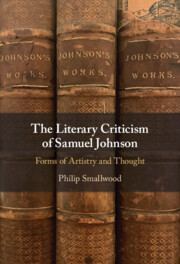Book contents
- The Literary Criticism of Samuel Johnson
- The Literary Criticism of Samuel Johnson
- Copyright page
- Dedication
- Epigraph
- Contents
- Preface
- Acknowledgments
- Abbreviations
- Introduction
- Part I Johnson’s Criticism and the Forms of Feeling
- Part II Critical Relations and the Art of Literary History
- Part III Johnson, Dramatic Poetry and Thinking
- Part IV Time, Truth and History
- Chapter 7 Johnson and Time
- Chapter 8 Truth, Fiction and “Undisputed History”
- Part V Editing Lives, and Life
- Appendix Irony in Revolt: F. R. Leavis Reads Johnson
- Bibliography
- Index
Chapter 8 - Truth, Fiction and “Undisputed History”
from Part IV - Time, Truth and History
Published online by Cambridge University Press: 07 September 2023
- The Literary Criticism of Samuel Johnson
- The Literary Criticism of Samuel Johnson
- Copyright page
- Dedication
- Epigraph
- Contents
- Preface
- Acknowledgments
- Abbreviations
- Introduction
- Part I Johnson’s Criticism and the Forms of Feeling
- Part II Critical Relations and the Art of Literary History
- Part III Johnson, Dramatic Poetry and Thinking
- Part IV Time, Truth and History
- Chapter 7 Johnson and Time
- Chapter 8 Truth, Fiction and “Undisputed History”
- Part V Editing Lives, and Life
- Appendix Irony in Revolt: F. R. Leavis Reads Johnson
- Bibliography
- Index
Summary
This chapter tackles the term “truth” as a criterion of Johnson’s criticism. The central focus is Johnson’s apparent preference for poetical works based on actual events from history. In two exemplary cases from Dryden and Pope there is the implicit suggestion that such an anchorage in history is a merit. But there are many occasions – the defective historical allegory of Absalom and Achitophel and Johnson’s taste for the fanciful imaginings in Shakespeare’s comedies (as against the “Histories”). Here critical judgments cannot be reliably linked to such a preference. Analysis concludes that Johnson sought forms of artistry based in the foundational power of common experience: not the mystical, the occult or the abstruse. This is an emotional need for Johnson: The mind “loves” truth. But such a need in no way excluded the fact that Johnson attached extraordinary value to the poetical imagination; it did not weaken his demand for its presence in poetry.
- Type
- Chapter
- Information
- The Literary Criticism of Samuel JohnsonForms of Artistry and Thought, pp. 143 - 156Publisher: Cambridge University PressPrint publication year: 2023

